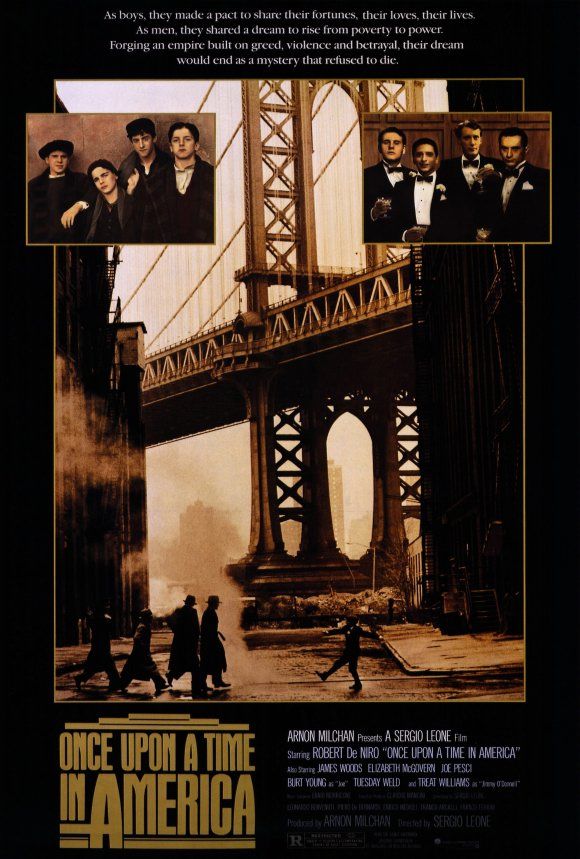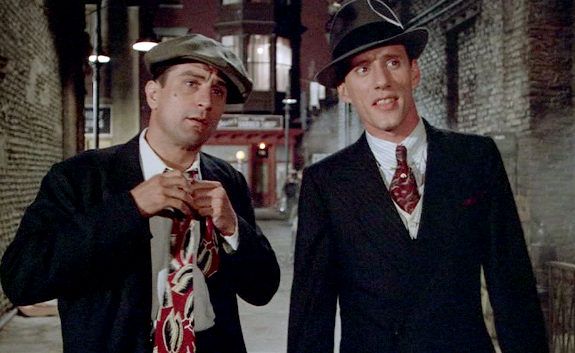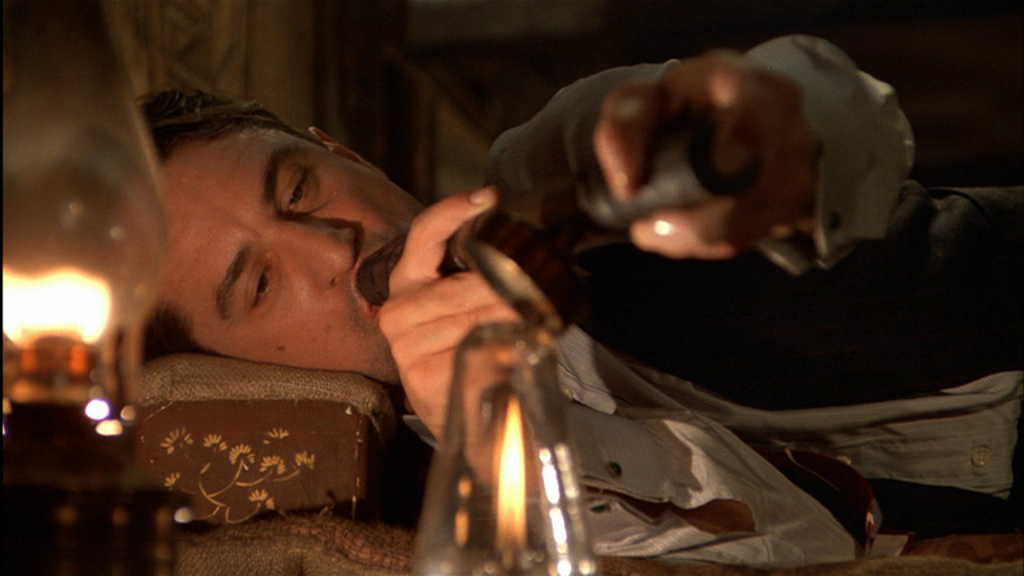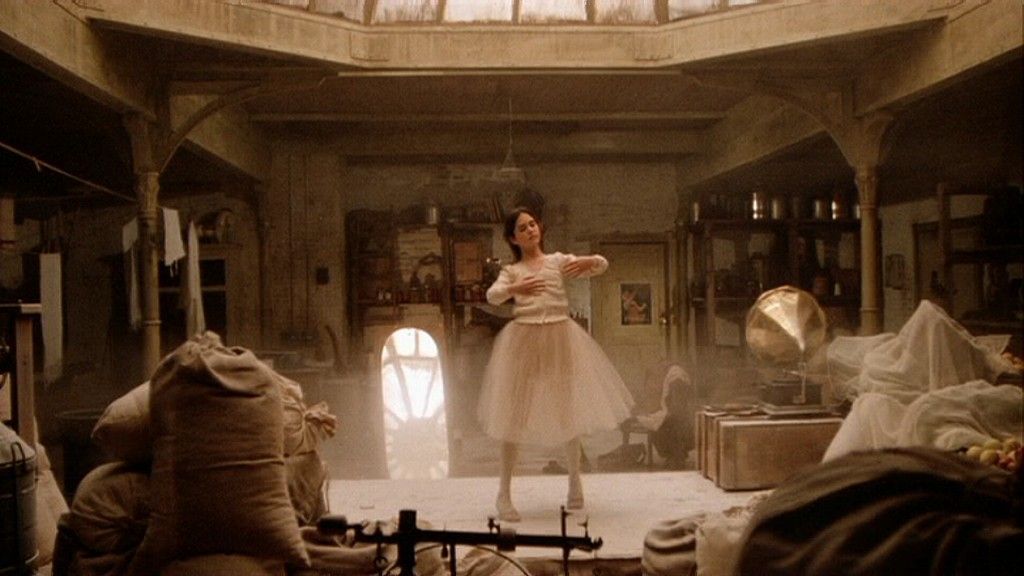Once
Upon a Time in America
1984
Director: Sergio Leone
Starring: Robert De Niro, James Woods,
Elizabeth McGovern
Lately,
it seems as though I’m tackling my first reviews of works by some of the most
renowned directors ever. I recently
wrote my first pieces on Kurosawa and Woody Allen, so I suppose that today, I
follow suit in writing my first piece about Leone. I’m not an enormous Leone fan. I find that I can appreciate him, but I tend
not to have that feeling of “YES THIS IS AWESOME!” from his films. Once Upon a Time in America is no
different. I liked it, it was fine, but
I feel no compunction to ever watch it again.
The
(rambling) story tells of David “Noodles” Aaronson (De Niro as an adult), a
young man growing up in the world of organized crime in the early twentieth
century Jewish ghettos of New York City.
The film opens (and closes) with Noodles in a 1933 opium den. The film cuts between Noodles’ youth where he
meets his friend and gangster co-conspirator Max (Woods as an adult) and falls
for lovely aspiring dancer Deborah (McGovern as an adult), then to Noodles’
adult career where he and Max have graduated to serious gangster activities,
and Noodles’ life in 1968 as an old man mysteriously called back to his old
haunts.
This
movie is more about people and mood and feeling than story. There’s very little plot; it’s much more a
character study than a narrative. Where
I felt Leone had some of his strongest moments were in the first half
hour. These 30 minutes cut between all
three timelines in the film, but there is a bare minimum of dialogue. We are introduced to several characters, we
determine who they are, but this is done mostly through mute sequences. It reminded me of the opening ten minutes of Once
Upon a Time in the West with the gunslingers at the train station. The opium den scene, which bookends the film,
gives the feeling of a dopey, hazy high.
Leone returns to this feeling several times at various points in the
film; every now and then, a dreamy feeling starts to take over. Leone himself has said that interpreting the
entire movie as Noodles’ recollections and dreams of the future while he’s at
the opium den is not necessarily wrong.
It’s certainly an interesting way to read the movie.
It
wouldn’t be Leone without violence. I
had some trouble with the violence in this one; it was a bit too brutal for
me. Proportionally, there isn’t a ton of
bloody scenes in the film, but the ones that were there made me turn away. I couldn’t watch all of them. I’m rather hypersensitive to violence in
film, and this was a movie that pushed the wrong buttons for me. Leone fanatics will probably say that was on
purpose; I say it made parts of the movie downright unpleasant.
The
women in the film drove me nuts. I don’t
know if Leone himself was actually a misogynist, but he does not like the women
in his films. Like nearly every other
Leone movie I have ever seen, all of the women in this film are either prostitutes,
nymphomaniacs, or exhibitionists. All of
them fall into one of those categories, even lovely Deborah, who is the most
sympathetic female character. She made a
few key decisions in the film (which I shall not give away) that I found rather
unforgivable. She claims to snub her
nose at the world of organized crime that Noodles is involved in, but she did
not. Not really. And another note to filmmakers: I don’t enjoy
watching rape. I really don’t. And you know what? Women don’t enjoy being raped, just FYI. I completely understand that this film is set
in the world of organized crime, that this is a really nasty, seedy world, and
that the men are hardly more redeemable than the women in this film, but I was
still bothered by it. Significantly. Having a man think it’s okay to do that… no.
Scored,
as you would expect, by Ennio Morricone (this IS a Leone film, after all), I
found the main theme of the film haunting.
The simple pan pipe melody, played with echo effects, is certainly
evocative of a dreamy feeling of recollection.
That fit the film very well. What
didn’t fit was basically every other part of the score, which felt like a poor
reimagining of “Summer Breeze.” It was
schmaltzy, sentimental, and unimaginative.
I know that it’s illegal, apparently, to criticize anything Morricone
wrote EVER, but I really felt as though he came up with a beautiful and unique
theme to the film, then completely phoned in every other portion of the
score.
Ultimately,
I didn’t really care for any of the characters in this movie. I didn’t really want to spend time with
them. I think Leone did a decent job, I
can certainly see his fingerprints all over this movie, and setting it in the
Jewish gangs rather than typical Italian gangs was something new. Fundamentally, though, I kept thinking to
myself “If I want to watch a Prohibition-era gangster movie, I would much
rather watch The Untouchables than this.”
That’s what it boils down to for me.
I guess I liked it. I know, I
know, high praise! But, as I said at the
beginning, I’m not a huge Leone fan. I
don’t diss his work, it’s just… not for me.
It was too misogynistic, too violent, with too many distasteful
characters. I shan’t be watching this
one again.
Arbitrary
Rating: 6/10. It’s alright.




This is a film that I remember as being too long for the story it tells, and I question why Leone would place an intermission after three hours with only an hour to go. The film feels top heavy and lopsided. This is sort of a theme with Leone in general--top heavy and too long.
ReplyDeleteI still liked it pretty well, but I'm with you on watching it again.
Yeah... by the end, it definitely felt a bit water-logged. Once Upon a Time in the West feels right, but pretty much every other Leone I've seen gets tedious at some point.
DeleteI liked this, but like you haven't ever felt the need to watch it again. The ringing phone really bugged me for how long it went on.
ReplyDeleteWhen you first called this film misogynist for the negative female characters I was getting ready to point out the obvious - that Leone's films are about the underbelly of humanity and that the men, who are killers, rapists, and criminals, are just as negatively portrayed as the women, making the film no more woman-hating than it is man-hating. You then backed off by admitting essentially that, so I wasn't going to respond on it. But then at the end of the post it's back to being a misogynist film again.
I'm reminded of the person who wrote to complain about how all the women in Sin City are prostitutes, killers, and "bad women" and about how this was misogynist. She then went on to lump all comic books, graphic novels, and any other form of illustrated stories as anti-woman as well. It took about 2 minutes for someone to point out that all the men in Sin City are scum, too, and that both the men and women are portrayed negatively precisely because the story is about the worst part of Basin City, hence the nickname "Sin City."
Chip, you then missed my point, which I should perhaps have made more clearly. It is the *sexualization* of ALL the women that I find frustrating, not the illegality of their actions. In fact, I do believe Leone could have gotten me to like this film more if he had a female character who was a burglar... and that was it. She never has sex. The only way to criminalize a female is by making her a prostitute? I object to that very much. The women are all merely sex objects, and none of them serve any other purpose. Blech. And that, I do believe, shows a rather warped view of women in general, so yes, I stand by my proclamation.
Deletegolden goose
ReplyDeletepalm angels hoodie
off white hoodie outlet
kyrie 7
supreme outlet
fear of god outlet
a bathing ape
yeezy boost 350
jordan outlet
supreme clothing